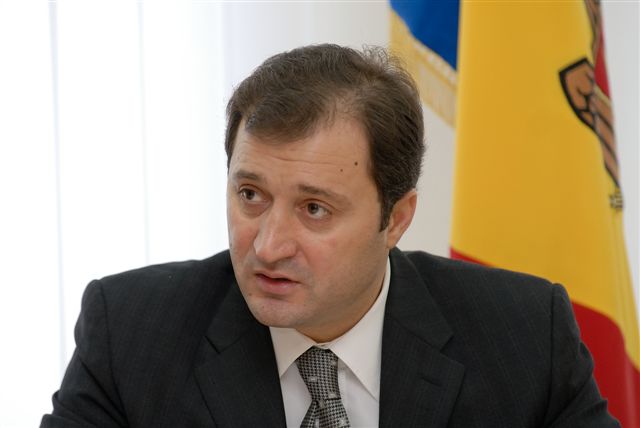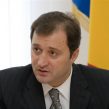
Moscow Seeks Political Allies in Moldova Ahead of Referendum and Elections
Publication: Eurasia Daily Monitor Volume: 7 Issue: 158
By:

The crash of Moldova’s experiment with a parliamentary system of government (EDM, August 6), predictable though it was, could not have occurred at a worse time for the country. When this experiment had first collapsed in 2000, Moldova still had a margin for error at its disposal, sheltered as it then was from direct Russian intrusion into its domestic politics. Even so, that first collapse of the parliamentary system ushered in eight years of Communist Party rule (2001-2009). This preserved the parliamentary republic pro forma while operating as a presidential republic de facto. The communists remain the single strongest party by far in the electorate and in parliament; and their leader, former President Vladimir Voronin, remains the most popular politician (although their ratings are in long-term decline)
The Alliance for European Integration (AEI), in power since September 2009, has reverted to a distorted form of the parliamentary system, using it to promote narrow partisan interests of the four component parties, under highly personalized leaderships. Their intractable rivalries have turned the AEI into a nominal alliance by now, its component parties engaged in a never-ending electoral campaign against each other, despite their having to face a strong communist opposition. At least since June, Moldova has lacked a fully legitimate parliament and government, or a legitimate head of state. The country will hold a constitutional referendum on September 5, followed by yet another round of double elections, parliamentary and presidential. It will be the third round of double elections (or fourth electoral round, counting the referendum) in just 19 months.
The second collapse of Moldova’s parliamentary system has opened wide opportunities for political exploitation by the Kremlin. With Moldova under a temporary government and in the throes of permanent elections, Russia exploits the partisan political rifts with a view to becoming their arbiter and mediating the formation of a new, more pliant Moldovan government.
Russian Presidential Administration Chief, Sergei Naryshkin, is in charge of coordinating the policy regarding Moldova’s domestic politics. Moscow wants to bring to power a new Moldovan government that would facilitate the attainment of Russian objectives in the country. The major objectives include: repositioning Moldova from its European orientation to a two-vector stance between Europe and Russia; inducing Chisinau to accept de facto, even short of formal consent (at least not challenging) the stationing of Russian troops on Moldova’s territory; accepting Russian preconditions (Moldovan “neutrality,” Russian “guarantees”) to negotiating a resolution of the Transnistria conflict; and locking pro-Romanian elements out of Moldova’s government while locking pro-Russia elements into the government.
The main non-communist contenders for power in Moldova are Prime Minister, Vlad Filat’s, Liberal-Democrat Party and former Parliamentary Chairman, Marian Lupu’s, Democratic Party; both in the AEI. They equally believe that they need Moscow’s blessing, or at least benevolent neutrality, in the upcoming elections. Filat, nominally from the center-right, goes out of his way to demonstrate to voters that he is best placed to improve Moldova’s relations with Russia on the economic front. He has tried hard, though unsuccessfully thus far, to obtain a meeting with Russian Prime Minister, Vladimir Putin, for internal political consumption by Moldovan voters. Lupu and his party, positioned on the left-of-center, are targeting the soft periphery of the communist and Russophone electorate. Thus, Lupu’s Democrats also calculate that they need to be seen as Russia-friendly in the upcoming elections. Putin and Russian President, Dmitry Medvedev, are topping the popularity ratings in a Moldova saturated by Russian television. This adds to other forms of Russian leverage on Moldova and its politicians at election time.
Moscow currently encourages the formation of a new political coalition, to consist of Lupu’s Democratic Party and Voronin’s Communist Party. Voronin spent several days in Moscow during the second week of August holding talks with Naryshkin and other officials. The Russian presidential administration announced the visit, but not the content of the talks (Interfax, August 10).
Moscow proposes a political coalition of these two parties on co-equal terms, with the same number of candidates for each, on a common electoral slate. With the communists looking strong in the polls, and Lupu’s personal ratings rising to second place behind Voronin (despite Lupu’s lack of administrative resources), Moscow apparently expects these two parties to be able to form a parliamentary majority, after the September 5 referendum and ensuing elections.
The Kremlin has settled on this scenario after having earlier considered holding two irons in the fire, in the form of Filat and Lupu. Apparently, Moscow gave up on Filat in July (if not somewhat earlier) and showed it publicly by rebuffing Filat’s attempts to negotiate the re-opening of Russia’s market for Moldovan wine. Filat had told the Moldovan people more than once that he would resolve this issue with Putin and the Russian government. Moscow responded through a series of insulting statements by the Head of the Consumer Protection Agency (RosPotrebNadzor), Gennady Onishchenko, not only refusing to relent, but refusing to speak with Moldovan government’s representatives. This demonstrative snub to Filat seems designed in Moldova’s electoral context to stop him and his party from winning over centrist votes, forcing him instead to compete against Acting President, Mihai Ghimpu’s, Liberal Party for the favor of right-of-center, right-wing and Romanian-leaning voters.
This may not be Moscow’s final decision, however. Russian officials on their visits to Chisinau continue to sound out all the principal political leaders there (excepting Ghimpu, following his symbolic gestures of disobedience to Moscow over the history of World War II, which have helped consolidate his relatively small electoral support). Naryshkin himself covered the spectrum of Moldovan political leaders during his several visits to Chisinau; and the Deputy Minister of Foreign Affairs and State Secretary, Grigory Karasin, did so again (minus Ghimpu and his party) during his visit, the most recent by a senior Russian official to Chisinau (Interfax, Moldpres, July 28).
Moscow has not yet decided conclusively, and meanwhile the idea of a Lupu-Voronin, Democratic Party-Communist Party political bloc is controversial within both parties.




